Best Face Watches [Key Factors To Consider]
Note: This page contains affiliate links.
As an Amazon Associate, I earn from qualifying purchases when you click on the link, but you are not charged extra.
When choosing the perfect timepiece, face watches stand out as both stylish and functional accessories. With countless designs, materials, and features available, selecting the right watch can feel overwhelming. Whether you’re looking for a sleek minimalist design or a bold, statement piece, understanding the variety of face sizes, dial types, and watch functionalities is crucial in making an informed decision. This buyer’s guide will help break down the essential factors to consider before purchasing a face watch, ensuring you find a piece that fits both your style and practical needs.
From analog classics to modern smartwatches, face watches have evolved to blend technology with elegance. The choice of face shape-round, square, or rectangular-can significantly influence the overall look and feel of the watch on your wrist. Beyond aesthetics, important aspects such as water resistance, durability, and movement type also play a key role in the longevity and usability of a watch. This guide will cover all these factors and more, helping you navigate the world of face watches to find the one that complements your lifestyle.
Best Face Watches: Quick Comparison Table
| Features | Pros | Cons | |
|---|---|---|---|
CakCity Military Sports Watch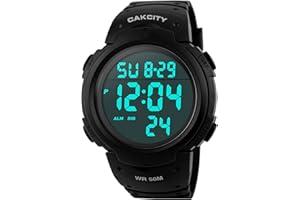 Check Price Check Price |
|
|
|
Men’s Classic Analog Dress Watch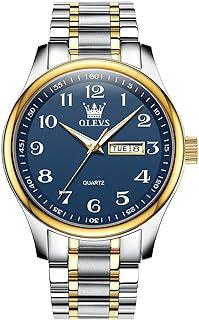 Check Price Check Price |
|
|
|
Men’s Luxury Chronograph Watch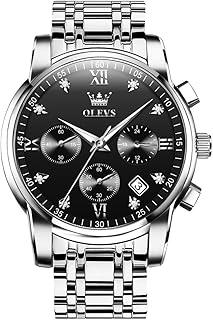 Check Price Check Price |
|
|
|
Mens Tactical Digital Analog Sport Watch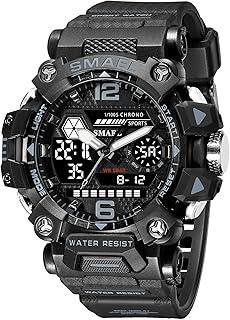 Check Price Check Price |
|
|
|
Men’s Luxury Dress Analog Watch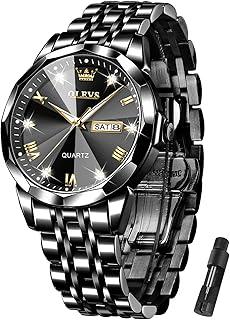 Check Price Check Price |
|
|
|
Unisex Luxury Analog Quartz Watch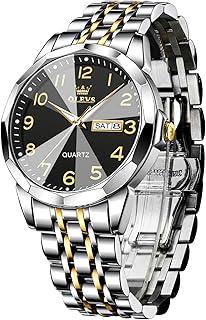 Check Price Check Price |
|
|
|
Men’s Classic Analog Two-Tone Watch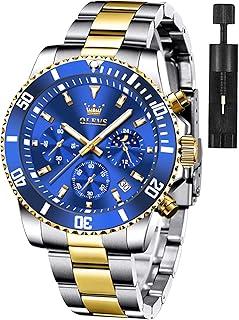 Check Price Check Price |
|
|
|
Women’s Tungsten Steel Dress Watch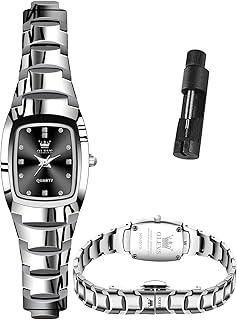 Check Price Check Price |
|
|
|
Women’s Premium Automatic Dress Watch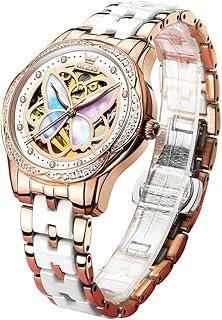 Check Price Check Price |
|
|
|
Women’s Luxury Small Face Dress Watch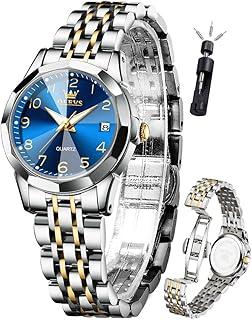 Check Price Check Price |
|
|
|
Recommendations For Best Face Watches
CakCity Military Sports Watch
The CakCity Military Sports Watch is designed for active individuals who need a reliable timepiece. Its large LED screen and waterproof design make it ideal for outdoor activities, while features like a stopwatch and alarm cater to various sports needs. The luminous display ensures visibility in low light conditions, making it a versatile choice for day and night.
Features:
- LED Screen
- Large Face
- Waterproof
- Luminous
- Stopwatch
- Alarm
Pros:
- Durable and waterproof design
- Large and easy-to-read display
- Multiple features for sports activities
- Affordable price point
Cons:
- Battery life may vary with features used
- Plastic construction may feel less premium
Men’s Classic Analog Dress Watch
The Men’s Classic Analog Dress Watch combines elegance and functionality, featuring a big face with easy-to-read Roman and Arabic numerals. This watch, crafted from durable stainless steel, offers a day and date function, making it a practical accessory for daily wear. With its waterproof capabilities, it seamlessly transitions from business meetings to casual outings.
Features:
- Stainless Steel Case
- Big Face
- Analog Quartz Movement
- Day and Date Function
- Waterproof
- Diamond Accents
Pros:
- Classic and elegant design
- Easy to read with large dial
- Waterproof for daily wear
- Versatile style for both casual and formal occasions
Cons:
- Heavyweight due to stainless steel construction
- Diamonds may be synthetic
Men’s Luxury Chronograph Watch
The Men’s Luxury Chronograph Watch is a statement piece that exudes sophistication. With its striking combination of gold, silver, and black tones, it features a big face with diamond Roman numerals for a touch of elegance. The chronograph functionality makes it a perfect companion for sports enthusiasts, while its waterproof feature ensures durability in various conditions.
Features:
- Chronograph Functionality
- Big Face
- Gold, Silver, and Black Tones
- Analog Quartz Movement
- Waterproof
- Diamond Roman Numerals Dial
Pros:
- Stylish and luxurious appearance
- Multiple timing functions for sports
- Waterproof design for versatility
- Clear readability with large dial
Cons:
- Complexity in operation due to multiple functions
- Might be heavy for some wearers
Mens Tactical Digital Analog Sport Watch
The Mens Tactical Digital Analog Sport Watch is designed for the adventurous spirit. With both digital and analog displays, it provides a user-friendly experience for timing and scheduling. Its waterproof nature and robust construction make it ideal for outdoor activities, while features like the LED alarm and stopwatch cater to the needs of active individuals.
Features:
- Digital and Analog Display
- Waterproof
- LED Alarm
- Stopwatch
- Calendar
- Available in Multiple Colors
Pros:
- Versatile design for various activities
- User-friendly interface with dual display
- Robust construction for outdoor use
- Waterproof feature enhances durability
Cons:
- Can be bulky for smaller wrists
- Battery life may diminish with frequent use of features
Men’s Luxury Dress Analog Watch
The Men’s Luxury Dress Analog Watch is the perfect fusion of style and functionality. With its stainless steel construction and diamond accents, it radiates elegance suitable for both formal and casual occasions. The day and date function adds to its practicality, while its waterproof feature ensures it stands up to daily wear and tear.
Features:
- Stainless Steel Construction
- Analog Quartz Movement
- Day and Date Function
- Waterproof
- Diamond Accents
- Large Face
Pros:
- Elegant design suitable for formal occasions
- Day and date function enhances practicality
- Durable and waterproof for everyday use
- Large face for easy readability
Cons:
- May require regular polishing to maintain shine
- Diamonds may be synthetic, affecting luxury perception
Unisex Luxury Analog Quartz Watch
The Unisex Luxury Analog Quartz Watch features a large face that combines style with functionality. Designed for both men and women, it boasts diamond accents and a luminous display for elegance and practicality. Its waterproof nature ensures it withstands the rigors of everyday life, making it a versatile choice for any occasion.
Features:
- Large Face
- Analog Quartz Movement
- Waterproof
- Diamond Accents
- Luminous Display
- Date Function
Pros:
- Unisex design appeals to a wide audience
- Luminous display for visibility in the dark
- Durable and waterproof for various activities
- Stylish and luxurious appearance
Cons:
- Large face may not suit smaller wrists
- Limited functionality beyond basic timekeeping
Men’s Classic Analog Two-Tone Watch
The Men’s Classic Analog Two-Tone Watch combines traditional styling with contemporary features. The big face allows for easy readability, while the luminous details enhance visibility in darker environments. With a date function and waterproof design, this watch is perfect for both business and casual settings.
Features:
- Big Face
- Analog Movement
- Waterproof
- Luminous Features
- Two-Tone Stainless Steel
- Date Function
Pros:
- Timeless design with a modern touch
- Clear readability with a big face
- Waterproof for everyday use
- Luminous features for low light conditions
Cons:
- May be too bulky for some wearers
- The two-tone design may not appeal to everyone
Women’s Tungsten Steel Dress Watch
The Women’s Tungsten Steel Dress Watch is an elegant accessory that combines durability with style. Crafted from tungsten steel, it boasts a waterproof design and features an analog quartz movement. The diamond dial adds a luxurious touch, while the square face offers a unique aesthetic, making it a standout piece for any occasion.
Features:
- Tungsten Steel Construction
- Waterproof
- Analog Quartz Movement
- Diamond Dial
- Square Face
- Casual Design
Pros:
- Durable and scratch-resistant tungsten steel
- Elegant design suitable for dress occasions
- Waterproof for daily wear
- Diamond dial adds luxury
Cons:
- Square face may not be preferred by everyone
- Weight might be heavier than traditional materials
Women’s Premium Automatic Dress Watch
The Women’s Premium Automatic Dress Watch is a luxurious timepiece featuring a self-winding mechanism, ensuring you never have to worry about battery changes. With a large face adorned with diamond accents, this watch is both fashionable and functional. Its two-tone stainless steel and ceramic bracelet adds elegance, while the waterproof design makes it suitable for a variety of occasions.
Features:
- Self-Winding Mechanism
- Large Face
- Diamond Accents
- Waterproof
- Two-Tone Stainless Steel and Ceramic Bracelet
- Fashionable Design
Pros:
- Automatic movement eliminates battery replacement
- Stylish two-tone design
- Large face enhances visibility
- Waterproof feature for durability
Cons:
- Higher price point due to automatic movement
- Weight may be heavier than quartz watches
Women’s Luxury Small Face Dress Watch
The Women’s Luxury Small Face Dress Watch offers a compact yet elegant design perfect for formal occasions. Adorned with diamond accents and available in gold and silver tones, it exudes luxury. The waterproof feature ensures durability, while luminous details enhance readability in low-light situations, making it a practical yet stylish choice.
Features:
- Small Face
- Diamond Accents
- Gold and Silver Tones
- Waterproof
- Luminous Features
- Date Function
Pros:
- Compact size for a delicate look
- Luxurious design with diamond accents
- Waterproof for everyday wear
- Luminous features for visibility in low light
Cons:
- Small face may be difficult to read for some
- Limited functionality compared to larger watches
What To Consider When Choosing Face Watches
When selecting a face watch, several factors can influence your choice, ranging from practical considerations to personal preferences. The following sections delve into the critical aspects to keep in mind while choosing the perfect timepiece for your needs.
1. Watch Type And Purpose
The type of watch you choose should align with its intended purpose. There are various categories of watches, including:
-
Dress Watches: Typically elegant and minimalist, these watches are perfect for formal occasions. They often feature slim profiles and classic designs, made from materials like stainless steel, gold, or leather.
-
Sport Watches: Designed for active lifestyles, sport watches are usually more robust and feature functionalities such as water resistance, shock resistance, and additional features like chronographs or GPS.
-
Diving Watches: These watches are built to withstand high pressure and water exposure. They often feature luminous hands and markers for visibility in low-light conditions, as well as rotating bezels to track elapsed time underwater.
-
Smartwatches: Combining traditional timekeeping with advanced technology, smartwatches offer features like fitness tracking, notifications, and customizable watch faces. They’re ideal for tech-savvy individuals seeking convenience and connectivity.
Choosing the right type involves evaluating your lifestyle and identifying how you plan to use the watch. If you’re often in formal settings, a dress watch might be more suitable, while outdoor enthusiasts may prefer a sport or diving watch.
2. Movement And Mechanism
The movement of a watch refers to the mechanism that drives its functionality. The three primary types of movement include:
-
Quartz: Powered by a battery, quartz watches are known for their accuracy and low maintenance. They require minimal care beyond battery replacements and are generally more affordable.
-
Mechanical: These watches are powered by intricate gears and springs, making them a marvel of engineering. Mechanical watches are often considered more prestigious due to their craftsmanship. Within this category, you’ll find manual and automatic movements. Manual movements require winding by hand, while automatic movements self-wind with wrist motion.
-
Hybrid: Combining elements of both quartz and mechanical, hybrid watches may include features such as smartwatch capabilities while maintaining a traditional look.
When choosing a movement type, consider your preference for accuracy, maintenance, and aesthetic appeal. If you appreciate craftsmanship and are willing to invest time in maintenance, a mechanical watch may be ideal. On the other hand, if you prioritize convenience and precision, a quartz movement would serve you well.
3. Material And Durability
The materials used in the construction of a watch significantly impact its durability and overall aesthetics. Common materials include:
-
Stainless Steel: Known for its robustness and resistance to corrosion, stainless steel is a popular choice for both casual and formal watches.
-
Titanium: Lighter than stainless steel yet equally durable, titanium watches are ideal for those who prefer comfort without sacrificing strength.
-
Ceramic: Often used for stylish watches, ceramic is scratch-resistant and lightweight, making it a popular choice for high-end models.
-
Gold and Platinum: While luxurious, these materials require more maintenance and care. They are typically used in dress watches and are more susceptible to scratches and dents.
In addition to the case material, consider the watch glass. Sapphire crystal is highly scratch-resistant and often found in premium watches, while mineral glass is more common in budget-friendly options. Assess your lifestyle to determine the right materials; if you lead an active life, opt for tougher materials.
4. Size And Fit
The size and fit of a watch are crucial for both comfort and style. Watches are available in various case sizes, typically ranging from 34mm to 50mm in diameter. When choosing the right size, consider:
-
Wrist Size: A watch should complement your wrist size. Smaller wrists may look best with a case size of 34mm to 40mm, while larger wrists can pull off bigger cases.
-
Thickness: The thickness of the watch can also affect comfort and style. Thicker watches can feel bulkier on the wrist, so finding a balance that feels right is essential.
-
Strap Length and Type: The strap material (leather, metal, rubber) and length can impact how the watch feels. Adjustable straps provide a better fit, ensuring comfort throughout the day.
Before making a purchase, try the watch on to see how it feels. The ideal watch should fit snugly but not too tight, allowing for movement without pinching.
5. Design And Aesthetics
The design of the watch is where personal style truly comes into play. Consider the following elements:
-
Dial Design: The face of the watch, including its color, layout, and features (such as sub-dials or date displays), should reflect your taste. A minimalist dial may appeal to some, while others may prefer a more intricate design.
-
Color and Finish: Choose colors that complement your wardrobe. Classic colors like black, silver, and gold are versatile, while bold colors can make a statement.
-
Style Consistency: Ensure that the watch aligns with your overall style. A dress watch may not pair well with casual attire, and vice versa. Consider your typical outfits and choose a watch that harmonizes with your personal style.
6. Brand And Heritage
The brand of a watch can often indicate its quality, reliability, and resale value. Established brands often have a reputation for craftsmanship, innovation, and customer service. Researching brands can provide insights into their history, reputation, and product offerings. Consider the following:
-
Brand Reputation: Look for brands with a solid track record and customer reviews that highlight durability and quality.
-
Heritage and Craftsmanship: Some brands boast rich histories and exceptional craftsmanship, which can enhance the watch’s appeal and value.
7. Budget And Value
Watches are available at various price points, and it’s crucial to establish a budget before shopping. Factors influencing the price include brand reputation, materials, movement type, and additional features. Here are a few points to consider:
-
Cost vs. Value: While some watches come with hefty price tags due to brand prestige, assess whether the features justify the cost.
-
Investment: High-end watches can retain or even appreciate in value over time. If you’re considering a luxury watch, research models known for their investment potential.
-
Affordability: It’s essential to find a watch that fits your budget while meeting your style and functional needs. There are quality options available at various price points, so prioritize what features matter most to you.
8. Warranty And After-Sales Service
A good warranty reflects a brand’s confidence in its product. Consider the following:
-
Warranty Length: Longer warranties may indicate better quality and assurance from the manufacturer.
-
Service and Repair: Research the brand’s after-sales service. A reliable service network is essential for repairs and maintenance, especially for high-end mechanical watches.
9. Reviews And Recommendations
Before making a final decision, seeking opinions from others can provide valuable insights. Online reviews, watch forums, and recommendations from friends or family can help you gauge the watch’s quality and performance.
Choosing the right face watch is an intricate process that goes beyond simply picking a timepiece. By considering various aspects such as the type of watch, movement, materials, size, design, brand reputation, budget, and after-sales service, you can make an informed decision that aligns with your lifestyle and personal preferences.
A watch is not merely a tool for telling time; it reflects your personality, taste, and values. Whether you are seeking a statement piece, a reliable companion for daily wear, or an investment for the future, understanding what to look for ensures that your choice will not only be aesthetically pleasing but also functional and durable.
Investing time in research and consideration will lead to the acquisition of a watch that serves you well for years to come. Remember that the perfect watch is one that fits seamlessly into your life, enhancing your style and keeping you connected to moments that matter.
Benefits Of Owning Face Watches
Owning a face watch, often simply referred to as a wristwatch, transcends the mere act of telling time. It embodies a fusion of style, functionality, and craftsmanship that appeals to individuals across various walks of life. Whether it’s a sleek dress watch, a rugged sports model, or a smart wearable, the benefits of owning a face watch can be profound and multifaceted.
1. Timeless Elegance And Personal Style
One of the most significant advantages of wearing a face watch is its ability to enhance personal style. A well-chosen watch acts as an accessory that complements an outfit, much like a piece of jewelry. From classic leather straps to modern metal designs, watches come in myriad styles that can express individuality.
For formal occasions, a sophisticated timepiece with a minimalist dial can exude elegance and refinement. Conversely, a vibrant sports watch can convey a sense of adventure and energy. The variety of designs allows wearers to select a watch that reflects their personality, making it a quintessential part of their attire.
2. Practicality And Functionality
In our fast-paced world, a watch offers practical benefits that go beyond style. First and foremost, it provides a convenient way to check the time without reaching for a smartphone, which can be particularly beneficial in professional settings. A quick glance at the wrist can convey confidence and efficiency, allowing for seamless time management during meetings or social interactions.
Moreover, many watches come equipped with additional functionalities that enhance their practicality. Chronographs can track elapsed time, dive watches feature depth gauges, and smartwatches provide notifications and health tracking. Such features can cater to specific lifestyles, whether someone is an athlete needing precise timing or a busy professional managing multiple tasks.
3. Craftsmanship And Heritage
Owning a quality watch often entails an appreciation for the art of horology—the study and measurement of time. Watches from reputable brands are often the result of meticulous craftsmanship, with some models featuring intricate movements visible through transparent case backs.
Collectors and enthusiasts often find joy in learning about the history and heritage behind their timepieces. Many watchmakers have decades, if not centuries, of tradition, leading to unique stories woven into each piece. This connection to heritage can make the ownership experience more meaningful, as individuals become part of a larger narrative within the world of watchmaking.
4. Investment Potential
While many people view watches as functional accessories, some timepieces, especially luxury models from esteemed brands, can also serve as investment assets. Over time, certain watches appreciate in value, making them not just a purchase but a financial asset. Limited editions and models with historical significance often see substantial increases in value, attracting collectors and investors alike.
This investment potential encourages individuals to research and choose their watches wisely, considering factors such as rarity, brand reputation, and condition. A well-chosen watch can yield returns far beyond its initial cost, transforming it into a financial resource.
5. Social Status And Connection
Wearing a distinctive watch can serve as a status symbol, subtly conveying personal success or taste. In social and professional circles, the type of watch one wears often sparks conversations and can lead to networking opportunities.
Furthermore, watches can create connections among enthusiasts. The shared passion for horology fosters communities, whether through online forums or local watch clubs. Owning a face watch can thus act as a gateway to meeting like-minded individuals who share a deep appreciation for the artistry and technology of timekeeping.
6. Symbol Of Time Management
A watch embodies the principle of time management—a critical skill in today’s busy world. By wearing a watch, individuals may develop a greater awareness of time, encouraging punctuality and efficient planning.
In a culture where distractions abound, having a dedicated tool to track time can reinforce focus and discipline. The act of actively checking the time can remind wearers to stay on task, making them more productive in both personal and professional endeavors.
The benefits of owning a face watch extend far beyond the simple act of telling time. A watch is an extension of personal style, a tool of practicality, a testament to craftsmanship, and even a potential investment asset.
As a symbol of time management and social connection, a face watch is not merely an accessory but a cherished companion in the journey of life. It captures moments, marks milestones, and adds depth to one’s identity. Whether chosen for its elegance, functionality, or historical significance, a watch remains a timeless investment—one that will continue to tick long after the fleeting moments of today become memories. Thus, investing in a quality timepiece is investing in a piece of history, art, and personal narrative that transcends generations.
Features To Look For In The Best Face Watches
When exploring the world of face watches, the myriad of styles, functionalities, and innovations can be both exciting and overwhelming. As you embark on your quest to find the perfect timepiece, consider several key features that will enhance not only the watch’s aesthetic appeal but also its functionality, durability, and user experience. Below are some of the most critical features to look for in the best face watches:
1. Display Type: Analog Vs. Digital
The first consideration in choosing a watch is the display type. Analog watches feature a classic aesthetic with hour and minute hands moving around a dial, often enhanced with intricate designs and craftsmanship. These watches can convey a sense of elegance and tradition, making them suitable for formal occasions.
On the other hand, digital watches offer a more modern look, showcasing time through numerical displays and often incorporating additional features like backlighting and customizable faces. Digital watches can also include more advanced functionalities such as fitness tracking, notifications, and even GPS capabilities, catering to a more tech-savvy audience.
Some hybrid watches combine both analog and digital features, appealing to those who want the best of both worlds. Your choice will ultimately depend on your style preference and the intended use of the watch.
2. Material Quality
The material of a watch significantly impacts its durability, weight, and overall aesthetic. Common materials include stainless steel, titanium, ceramic, and leather. Stainless steel is the most popular choice due to its robustness and resistance to tarnishing. Titanium, while lightweight and hypoallergenic, offers exceptional strength, making it ideal for active lifestyles.
Ceramic watches provide a unique, scratch-resistant surface that maintains a polished appearance over time. Leather straps, on the other hand, lend a classic and sophisticated touch but require more care to prevent wear and tear. When assessing materials, consider how the watch will fit into your lifestyle and ensure it meets your durability needs.
3. Water Resistance
In today’s active world, water resistance has become an essential feature for many watch enthusiasts. Whether you are a swimmer, a frequent traveler, or simply someone who enjoys outdoor activities, look for watches with a robust water resistance rating. Typically measured in meters (e.g., 30m, 50m, 100m, etc.), these ratings indicate how well a watch can withstand moisture.
For everyday wear, a water resistance of 30 meters is generally adequate, but if you plan to swim or dive, consider watches with a rating of at least 100 meters. Additionally, always check for specific manufacturer guidelines regarding water exposure to ensure longevity.
4. Movement: Quartz Vs. Automatic
The movement of a watch refers to the mechanism that powers it. Quartz watches, known for their accuracy and low maintenance, utilize a battery and are favored for their reliability. They tend to be more affordable and can come in various styles, making them suitable for daily wear.
Conversely, automatic or mechanical watches rely on intricate gears and movements powered by the motion of the wearer’s wrist. These timepieces are often regarded as art forms due to their craftsmanship and complexity. While they may require more care and occasional winding, many enthusiasts appreciate the traditional artistry and the romantic notion of wearing a watch powered by human movement.
5. Features And Functionality
Modern watches can serve numerous functions beyond merely telling time. Depending on your lifestyle, you might seek features such as:
- Chronographs: These watches can function as stopwatches, useful for athletes and professionals who require precise timing.
- Smart Features: Smartwatches integrate technology, allowing users to receive notifications, track health metrics, and even control other devices.
- GPS: For outdoor enthusiasts, a GPS-enabled watch can provide navigation and location tracking during adventures.
- Heart Rate Monitors: Fitness enthusiasts often prefer watches with built-in heart rate monitors to track their workouts efficiently.
As you evaluate these features, think about how you intend to use the watch. The best face watch will seamlessly blend style with the specific functionalities that enhance your daily life.
6. Style And Aesthetic Appeal
The watch’s style is undeniably one of the most important factors when making your choice. A watch should not only be functional but also a reflection of your personality and taste. Consider the watch’s design elements, such as the color, size, and overall aesthetic. Whether you prefer a minimalist design, a classic chronograph, or a bold statement piece, the options are virtually limitless.
Additionally, consider how the watch will coordinate with your wardrobe. A versatile watch that transitions effortlessly from casual to formal settings will offer the most value. Accessories, such as interchangeable straps, can also add to the watch’s versatility, allowing you to customize its look to suit different occasions.
7. Brand Reputation And Warranty
When investing in a face watch, it’s essential to consider the brand’s reputation and the warranty offered. Established brands often provide assurances of quality, craftsmanship, and service. A good warranty can indicate a manufacturer’s confidence in their product and provide peace of mind in case of any defects or issues.
Research customer reviews, brand history, and the warranty terms to ensure you choose a watch that not only meets your aesthetic and functional needs but is also backed by reliable customer support.
Selecting the best face watch involves a careful balance of style, functionality, and quality. By considering essential features such as display type, material quality, water resistance, movement, and additional functionalities, you can find a timepiece that not only meets your practical needs but also complements your personal style.
As you navigate through the myriad of options available, remember to reflect on how the watch aligns with your lifestyle and preferences. A well-chosen watch becomes more than just a tool for telling time; it becomes an extension of your identity, a piece of craftsmanship that tells a story, and a reliable companion for years to come.
Ultimately, the best face watch is one that resonates with you on a personal level, embodies the values you cherish, and serves as a lasting reminder of the moments you cherish. Whether you opt for the sophistication of an analog timepiece, the innovation of a smartwatch, or the intricate artistry of a mechanical watch, let your choice reflect your unique style and the life you lead. With careful consideration of the key features, you are well on your way to finding a watch that will not only adorn your wrist but also enrich your daily experiences.
How To Choose The Right Size
When it comes to selecting a watch, the face size is arguably one of the most significant factors to consider. A watch is more than just a timekeeping device; it serves as an accessory that reflects personal style and complements one’s wardrobe. The right size can enhance your overall look, while the wrong one can feel cumbersome or out of place. Here’s a detailed guide on how to choose the right watch face size for your wrist.
Understanding Watch Face Sizes
Watch faces come in a variety of sizes, typically measured in millimeters (mm). Standard sizes for men’s watches generally range from 38 mm to 46 mm, while women’s watches often fall between 26 mm and 36 mm. However, these ranges are not strict rules but rather guidelines that can be adapted based on personal style, wrist size, and the watch’s intended use.
-
Small Faces (26-34 mm): Often favored by those with smaller wrists or those who prefer a more delicate, understated look. These watches can exude elegance and are perfect for formal occasions. They often feature intricate designs that might get lost on larger faces.
-
Medium Faces (34-40 mm): A versatile size that suits most wrist sizes. Medium-faced watches offer a balance of elegance and presence, making them suitable for both casual and formal settings. They often feature a blend of function and style, perfect for everyday wear.
-
Large Faces (40-50 mm): Large watch faces are popular in modern fashion, appealing to those who enjoy making a bold statement. These watches can provide additional features such as chronographs or multiple dials, but they can also feel heavy and overwhelming on smaller wrists.
Measuring Your Wrist
To determine the best watch face size for you, it’s crucial to measure your wrist. Here’s how to do it accurately:
-
Use a Flexible Measuring Tape: Wrap a measuring tape around your wrist just above the bone. Make sure it fits snugly but isn’t too tight.
-
Record the Measurement: Note the circumference in millimeters. If you don’t have a measuring tape, a piece of string can work—just mark where it overlaps, then measure the string against a ruler.
-
Determine Your Watch Size: As a general rule of thumb:
- Wrist Size Below 6.5 inches (165 mm): Smaller watches (26-34 mm) often work best.
- Wrist Size Between 6.5 to 7.5 inches (165-190 mm): Medium watches (34-40 mm) are ideal.
- Wrist Size Above 7.5 inches (190 mm): Larger watches (40-50 mm) can look proportionate and stylish.
Style Considerations
In addition to wrist size, personal style plays a vital role in choosing a watch face.
-
Casual vs. Formal: A more intricate watch with a smaller face might be more suitable for formal occasions, while a larger, bolder watch can complement casual outfits.
-
Watch Purpose: Think about when and where you plan to wear the watch. A sports watch designed for active wear may have a larger face for better visibility, while a dress watch will likely feature a slimmer profile.
-
Personal Preference: Ultimately, the right size comes down to what you feel comfortable wearing. Some people prefer the feeling of a substantial watch on their wrist, while others opt for something more lightweight.
Trends And Comfort
In recent years, trends in watch sizing have shifted towards larger faces, reflecting a more robust and adventurous style. However, comfort should never be sacrificed for fashion. A watch should feel natural on your wrist, allowing for easy movement without being too loose or tight. Consider the watch’s weight and strap type; a well-designed watch should distribute weight evenly across your wrist.
Choosing the right size for a watch face is an art that intertwines practicality with personal style. It involves understanding the various sizes available, accurately measuring your wrist, and considering your unique aesthetic and functional needs. As you explore your options, remember that the best watch is one that not only tells time but also complements your individuality and lifestyle. Whether you gravitate towards the delicate elegance of a smaller face or the bold statement of a larger one, take the time to find a watch that resonates with you. Your choice will not only enhance your wardrobe but will also serve as a reflection of your personal style for years to come. Happy watch hunting!
Durability And Performance
In the realm of horology, the quest for durability and performance has led to the evolution of face watches, which serve as the centerpiece of any timepiece. These watches, often featuring intricate designs and advanced technology, are built to withstand the rigors of daily wear while delivering precision and reliability. Understanding the key components that contribute to the durability and performance of face watches can provide insights into the craftsmanship and engineering that go into creating these remarkable instruments.
The Anatomy Of Durability
At the heart of any durable watch lies its construction, which typically involves high-quality materials and meticulous craftsmanship. Most face watches feature cases made from stainless steel, titanium, or ceramic—materials chosen for their strength and resistance to corrosion.
Case Materials
-
Stainless Steel: Known for its durability, stainless steel is widely used in both luxury and everyday watches. Its ability to resist rust and withstand scratches makes it ideal for a variety of environments. Higher grades, such as 316L, are often utilized in premium timepieces for added strength and polish.
-
Titanium: For those seeking a lightweight alternative without sacrificing durability, titanium is an excellent choice. It boasts a high strength-to-weight ratio and is hypoallergenic, making it suitable for individuals with sensitive skin. Titanium watches are often seen as the go-to for sports enthusiasts and adventurers.
-
Ceramic: Increasingly popular in contemporary watch design, ceramic is both lightweight and extremely scratch-resistant. Advanced manufacturing techniques allow for the creation of colored ceramics that can match various fashion aesthetics while maintaining durability.
Glass And Crystal
The watch face is typically protected by a crystal, which can be made from a variety of materials, including acrylic, mineral glass, or sapphire.
-
Acrylic: While not as scratch-resistant as other materials, acrylic is highly shatter-resistant and is often used in more affordable watches. Its flexibility allows it to absorb impacts without breaking.
-
Mineral Glass: This type of glass is treated for enhanced durability, making it more resistant to scratches than acrylic but less so than sapphire. It’s often found in mid-range watches.
-
Sapphire Crystal: Regarded as the gold standard in watchmaking, sapphire crystal is virtually scratch-proof and highly durable. It is created through a process of crystallization, resulting in a hard, transparent material that can withstand extreme conditions.
Water Resistance
A crucial factor in the performance of any watch is its water resistance, which is measured in meters or atmospheres (ATM). Water resistance ratings typically range from 30 meters (splash-proof) to 300 meters (suitable for professional diving). Achieving these ratings requires the use of gaskets, O-rings, and screw-down crowns to ensure a watertight seal. The level of water resistance directly influences the versatility of the watch, allowing wearers to engage in various activities without fear of damage.
Performance Mechanisms
While durability ensures a watch can withstand physical challenges, performance speaks to its accuracy and functionality. The movement of the watch—the mechanism that powers it—is the heart of performance.
Mechanical Vs. Quartz Movements
The two primary types of movements found in face watches are mechanical and quartz, each offering distinct advantages.
-
Mechanical Movements: Often celebrated for their craftsmanship, mechanical movements are powered by a complex assembly of gears, springs, and levers. While they can be incredibly accurate, they require regular maintenance and winding. High-end mechanical watches can showcase intricate complications, such as tourbillons or perpetual calendars, which add to their allure.
-
Quartz Movements: Known for their precision, quartz movements use a battery-powered oscillator to keep time. These watches are generally more affordable and require less maintenance compared to their mechanical counterparts. The reliability and accuracy of quartz movements make them ideal for everyday wear.
Advanced Features
Many modern face watches incorporate advanced features that enhance performance and functionality. Some of these include:
-
Chronographs: These watches feature stopwatch functions, allowing users to time events with precision. The added complexity and additional dials enhance the watch’s functionality while providing an aesthetically pleasing design.
-
Smart Features: With the advent of smartwatches, many brands have integrated smart technology into traditional watch designs, offering features like fitness tracking, notifications, and connectivity to smartphones. This fusion of traditional craftsmanship with modern technology showcases how face watches are evolving to meet contemporary needs.
Timekeeping Accuracy
A watch’s accuracy is often measured in seconds gained or lost per day. High-quality quartz movements can achieve accuracy within ±15 seconds per month, while mechanical movements, especially those with chronometer certification, can maintain accuracy within ±4 to ±6 seconds per day. Regular calibration and servicing are crucial in maintaining optimal performance over time.
Face watches epitomize the delicate balance between durability and performance, showcasing the pinnacle of horological engineering. With advancements in materials and technology, modern face watches offer exceptional resilience to environmental challenges, whether it be through the robust case materials, shatter-proof crystals, or water resistance features.
The movement within these timepieces further enhances their appeal, blending traditional craftsmanship with innovative functionality, thus ensuring precision in timekeeping. Whether one is exploring the depths of the ocean, navigating a mountain trail, or attending a formal event, a well-crafted face watch serves as both a functional instrument and a statement piece, embodying the art and science of timekeeping.
In an era where fast-paced lifestyles dominate, the face watch remains a steadfast companion, a testament to durability and performance, continually evolving to meet the demands of discerning wearers. Thus, it stands as a symbol not only of time but also of the mastery of human ingenuity in the pursuit of perfection.
How To Care For Your Face Watches
Caring for your face watch goes beyond merely ensuring it keeps time accurately; it’s about preserving its aesthetic appeal, functionality, and longevity. A face watch, whether it be a classic analog timepiece or a modern smartwatch, is an investment that reflects personal style and status. Proper maintenance not only enhances its performance but also protects its value over time. Here are several essential steps and tips to help you take excellent care of your face watch.
1. Regular Cleaning
Cleaning your watch regularly is crucial for maintaining its visual appeal and functionality. Dust, dirt, and oils from your skin can accumulate on the watch face, case, and bracelet. Here’s how to clean it properly:
-
Materials Needed: Soft microfiber cloth, mild soap, water, soft brush (like a toothbrush), and a small bowl.
-
Process
- Remove the Watch: Take off the watch to avoid accidental damage during the cleaning process.
- Prepare the Cleaning Solution: Mix a small amount of mild soap with water in a bowl.
- Clean the Watch Band: Dip the soft brush into the soapy water and gently scrub the band, especially if it’s made of metal or leather. For leather bands, use a damp cloth instead to avoid soaking them.
- Wipe the Case and Face: Dampen a microfiber cloth with plain water and gently wipe the case and the watch face. Ensure not to get water into the crown or the caseback, especially if it’s not water-resistant.
- Dry Thoroughly: Use a dry microfiber cloth to wipe the watch dry, ensuring no moisture is trapped, especially in the crevices.
2. Avoid Extreme Conditions
Extreme temperatures and conditions can significantly affect the performance of your watch. Here’s what to watch out for:
-
Heat and Humidity: Prolonged exposure to high temperatures can damage the internal components of your watch. Additionally, humidity can lead to condensation under the glass, affecting visibility and potentially damaging internal mechanisms.
-
Cold: While most watches are designed to withstand cold temperatures, extreme cold can cause battery failure or impair the movement of mechanical watches. Avoid wearing your watch in very low temperatures for extended periods.
-
Magnetic Fields: Avoid exposing your watch to strong magnetic fields, which can disrupt the watch’s movement, especially in automatic and quartz timepieces.
3. Storage Practices
How you store your watch can significantly impact its condition. Proper storage protects the watch from scratches, dust, and potential mechanical issues.
-
Watch Box: Invest in a good quality watch box that provides padding and compartmentalization. This protects against scratches and keeps your watch secure.
-
Positioning: Store watches in a way that avoids pressure on the crown or buttons. If you own multiple watches, keeping them in separate compartments prevents them from banging against each other.
4. Regular Maintenance
Just like any other mechanical device, watches benefit from regular maintenance.
-
Servicing: Mechanical watches should be serviced every 3 to 5 years by a professional. This ensures that all parts are lubricated correctly, worn parts are replaced, and the watch is functioning as intended.
-
Battery Changes: For quartz watches, ensure to change the battery promptly to avoid leakage. Battery replacement is usually straightforward and can often be done by a professional jeweler.
5. Water Resistance Considerations
Many watches claim to be water-resistant, but this does not mean they are waterproof. Here’s how to care for water-resistant watches:
-
Check Seals Regularly: If you often wear your watch in water, have the seals checked during service to ensure they are intact and functioning correctly.
-
Post-Water Use: If your watch has been exposed to salt water, rinse it gently with fresh water to avoid corrosion.
6. Handle With Care
Your watch is delicate, even if it appears robust.
-
Avoid Dropping: Always handle your watch carefully, especially if it has a glass face. Dropping it can result in scratches or cracks.
-
Protective Cases: If you’re engaging in activities that could risk damage (like sports or heavy labor), consider investing in a protective case or wearing a more durable watch.
Caring for your face watch is an investment in its longevity, aesthetics, and functionality. By adopting regular cleaning practices, avoiding extreme conditions, storing it correctly, and ensuring it receives professional maintenance, you can preserve the beauty and performance of your watch for years to come. Remember that each watch has its unique needs based on its design, materials, and technology, so always refer to the manufacturer’s guidelines for specific care instructions. Whether your watch serves as a statement piece, a status symbol, or a functional accessory, proper care ensures it remains a timeless companion in your daily life, exuding elegance and precision with every tick of the second hand.
Comparing Face Watches With Alternatives
In the evolving landscape of timekeeping devices, the face watch has established itself as a timeless symbol of elegance, craftsmanship, and functionality. However, in the modern era, this classic accessory faces formidable competition from various alternatives, including digital watches, smartwatches, and even smartphone apps. Each of these alternatives presents unique features and advantages that cater to different lifestyles and preferences.
1. Traditional Analog Face Watches
Analog face watches, characterized by their mechanical movements and distinct hour and minute hands, have a charm that resonates with enthusiasts and casual wearers alike. The intricate designs, ranging from minimalistic to ornate, often incorporate high-quality materials such as stainless steel, leather, and precious metals. The artistry involved in creating these watches is unparalleled, with many brands emphasizing craftsmanship that can take years to master.
Pros
- Timeless Aesthetics: The appeal of a well-crafted watch lies in its ability to enhance one’s attire, be it casual or formal. A classic timepiece can exude sophistication, making it suitable for special occasions or daily wear.
- Longevity: Unlike their digital counterparts, analog watches do not rely on batteries; they can last a lifetime or more with proper care. Vintage watches often appreciate in value, making them not just a functional accessory but also a potential investment.
- Mechanical Mastery: For aficionados, the mechanical workings of an analog watch are fascinating. The precision of the gears, the sound of the ticking, and the visual elegance of the moving parts create a sensory experience that digital displays simply cannot replicate.
Cons
- Limited Functionality: Traditional watches typically serve one primary purpose: telling time. While some may include date functions or other complications, they lack the multifunctionality of digital and smart alternatives.
- Maintenance Needs: High-quality mechanical watches may require regular servicing to maintain their precision, which can be costly over time.
2. Digital Watches
Digital watches, often lauded for their simplicity and ease of use, display time through electronic screens. These devices range from basic models with LED displays to more advanced options that incorporate additional features such as timers, alarms, and backlighting.
Pros
- User-Friendly Interface: The clear and direct readout of time and functions makes digital watches accessible, especially for those who may struggle with reading traditional watch faces.
- Variety of Features: Many digital watches come equipped with features like countdown timers, stopwatch functions, and even calculators. Some are specifically designed for sports, offering heart rate monitors, GPS, and more.
Cons
- Less Aesthetic Appeal: While some digital watches are designed to be stylish, many lack the elegance and sophistication associated with traditional timepieces.
- Battery Dependence: Digital watches require batteries, which can limit their lifespan and create inconvenience when replacements are needed.
3. Smartwatches
Smartwatches represent the pinnacle of technological advancement in timekeeping. They offer a plethora of features that extend far beyond simply telling time, integrating seamlessly with smartphones to provide notifications, health tracking, and app functionalities.
Pros
- Connectivity and Notifications: Smartwatches can receive notifications from your phone, including calls, messages, and app alerts, allowing users to stay connected without needing to reach for their smartphones.
- Health and Fitness Tracking: Many smartwatches include advanced health metrics, such as heart rate monitoring, sleep tracking, and even ECG capabilities. For fitness enthusiasts, this data is invaluable for tracking performance and progress.
- Customization Options: Users can often personalize their smartwatches with various watch faces, bands, and apps, allowing for a level of customization that traditional watches do not offer.
Cons
- Battery Life Concerns: Unlike traditional and digital watches, smartwatches typically require more frequent charging, often needing a recharge every day or two, which can be inconvenient for some users.
- Distraction Potential: The multitude of notifications and apps can lead to distractions, detracting from the simplicity and elegance that a traditional watch embodies.
4. Smartphone Apps
In today’s digital age, many people rely on their smartphones for timekeeping, using various applications to tell the time and access additional features.
Pros
- Ubiquity and Convenience: Nearly everyone has a smartphone, making it easy to check the time and access features like alarms, timers, and calendars at a moment’s notice.
- Comprehensive Functionality: Apps can provide not only time but also reminders, productivity tools, and integration with other software, making them incredibly versatile.
Cons
- Lack of Fashion Appeal: While practical, checking the time on a smartphone lacks the elegance and sophistication of wearing a traditional watch.
- Overreliance on Technology: Relying solely on smartphones for timekeeping can lead to missed opportunities to appreciate the artistry of traditional watches.
In the grand tapestry of timekeeping, face watches maintain their place as not just functional devices, but as cultural artifacts that symbolize craftsmanship, heritage, and style. While alternatives like digital watches, smartwatches, and smartphone apps offer impressive features and convenience, they often fall short of the intrinsic value found in a beautifully crafted analog timepiece. Each option presents distinct advantages and drawbacks, catering to different user needs and lifestyles. Traditional analog watches shine in their aesthetic appeal and mechanical mastery, while digital and smart alternatives offer unparalleled functionality and connectivity. Ultimately, the choice between face watches and their alternatives boils down to personal preference, lifestyle demands, and the value one places on artistry versus convenience. In a world where technology continues to evolve, the allure of a classic face watch remains steadfast, serving as a reminder that sometimes, the simplest pleasures—a glance at a finely crafted watch—can provide the deepest satisfaction. Whether you opt for the sophisticated elegance of an analog watch, the practicality of a digital model, or the multifunctionality of a smartwatch, the key lies in finding the right balance that resonates with your unique identity and lifestyle.
Style And Design Trends For Face Watches
In the ever-evolving world of horology, style and design trends for face watches remain at the forefront, reflecting not only technological advancements but also shifting cultural values and aesthetic preferences. As we delve into the latest trends, it’s essential to explore how face watches have transcended their traditional roles, morphing into bold fashion statements that cater to diverse tastes and lifestyles.
1. Minimalism Meets Functionality
One of the most prominent trends in face watch design is the rise of minimalism. This trend emphasizes clean lines, uncluttered dials, and a reduction of superfluous elements. Watchmakers are increasingly adopting a less-is-more philosophy, focusing on functionality without compromising style. Brands like Daniel Wellington and Skagen have successfully embraced this aesthetic, offering timepieces that showcase elegance through simplicity.
Minimalist designs often feature monochromatic color palettes, allowing the craftsmanship of the watch to shine without distraction. These watches typically sport sleek hour markers and hands, enhancing readability while exuding sophistication. The minimalist trend caters to a younger, style-conscious demographic who value subtlety over ostentation, making it a vital component of contemporary watch design.
2. Retro And Vintage Revival
In stark contrast to the minimalist movement, the resurgence of retro and vintage styles is captivating enthusiasts and casual wearers alike. Inspired by classic models from the mid-20th century, watchmakers are breathing new life into timeless designs, infusing them with modern technology. This trend not only appeals to nostalgia but also pays homage to the rich history of watchmaking.
Iconic styles, such as the Tudor Black Bay and Omega Speedmaster, are being reimagined with contemporary materials and innovations while retaining their signature aesthetic features. The use of warm, earthy tones and textured dials evoke a sense of authenticity and craftsmanship that resonates with consumers. Vintage-inspired watches often showcase details like distressed leather straps and patinaed metal cases, enhancing their nostalgic charm and appeal.
3. Bold Colors And Unique Materials
Gone are the days when face watches were limited to traditional metals and muted tones. Today’s designs are increasingly experimenting with bold colors and innovative materials, catering to a more diverse and adventurous clientele. Bright hues, like vibrant greens, deep blues, and striking reds, have become popular choices, often featured in both the watch face and straps.
Furthermore, the exploration of materials extends beyond classic stainless steel and leather. Brands are now utilizing ceramic, titanium, and even carbon fiber, offering lightweight, durable, and scratch-resistant options. Swatch and Casio exemplify this trend with their playful designs and use of unconventional materials, appealing to a younger audience eager to express their individuality through accessories.
4. Smart Features And Hybrid Watches
As technology continues to intertwine with fashion, the rise of smartwatches has significantly influenced traditional watch design. However, rather than seeing a decline in classic timepieces, there has been a shift towards hybrid watches that merge the elegance of traditional face watches with smart features.
Brands like Fossil and Garmin have developed models that maintain a classic aesthetic while incorporating fitness tracking, notifications, and customizable watch faces. This fusion allows consumers to enjoy the best of both worlds: the craftsmanship of a traditional watch coupled with the convenience of modern technology. The integration of smart features into classic designs appeals to tech-savvy individuals who appreciate functionality without sacrificing style.
5. Sustainability In Watchmaking
In recent years, sustainability has become a cornerstone of consumer choice across various industries, and the watch sector is no exception. Modern consumers are increasingly drawn to brands that prioritize environmentally friendly practices and materials. This trend is evident in the rise of watches crafted from recycled materials, vegan leather, and ethically sourced metals.
Companies like Nordgreen and Bamford Watch Department emphasize transparency in their production processes, appealing to an audience that values ethical consumption. By embracing sustainable practices, these brands not only contribute positively to the environment but also resonate with a conscientious consumer base that seeks to make a difference through their purchases.
Conclusion
The world of face watches is a vibrant tapestry woven with intricate styles, innovative designs, and evolving consumer preferences. From the minimalist aesthetic that celebrates simplicity to the nostalgic charm of vintage revivals, the trends in face watches reflect a deep understanding of cultural dynamics and the aspirations of modern consumers.
As technology continues to advance, the integration of smart features into traditional designs represents a fascinating convergence of craftsmanship and innovation. Moreover, the rising emphasis on sustainability showcases a shift in values, compelling brands to adopt responsible practices that align with the consciousness of today’s consumers.
In this dynamic landscape, face watches have emerged not just as timekeeping devices, but as powerful expressions of individuality and style. As we look ahead, it will be intriguing to see how these trends evolve, further shaping the future of horology while continuing to captivate enthusiasts and fashion-forward individuals alike. Whether through bold colors, minimalist designs, or sustainable practices, the face watch remains a timeless accessory, poised to adapt and thrive in the ever-changing world of fashion.
FAQs
What Is A Face Watch?
A face watch refers to a traditional or smart wristwatch that displays the time and other information on its “face”, which is the visible, front part of the watch. It can come in analog or digital formats, depending on the watch model.
What Are The Different Types Of Watch Faces Available?
Watch faces typically come in two types: analog and digital. Analog faces have hands that point to numbers or markers, while digital watch faces show the time using digits. Smartwatches can feature customizable digital faces with various designs, functions, and widgets.
Can I Customize The Watch Face On A Smartwatch?
Yes, most smartwatches allow users to customize their watch faces by choosing different designs, colors, and layouts. You can also add widgets like weather updates, step count, and calendar events depending on the smartwatch model.
How Do I Choose The Right Watch Face Size?
The ideal watch face size depends on your wrist size and personal style. Generally, a 38-42mm case suits smaller wrists, while larger wrists can accommodate 44-46mm or bigger. It’s important to try different sizes to find what feels comfortable and proportional to your wrist.
What Materials Are Used For Watch Faces?
Watch faces are typically made from materials like sapphire crystal, mineral glass, or acrylic. Sapphire crystal is highly scratch-resistant and durable, while mineral glass is affordable but less durable. Acrylic is lightweight but can scratch easily.
What Features Should I Look For In A Smartwatch Face?
In a smartwatch, look for a customizable watch face that supports features like notifications, fitness tracking, heart rate monitoring, and weather updates. Some smartwatches also allow you to set interactive or animated faces.
How Do I Change The Watch Face On My Smartwatch?
To change the watch face on most smartwatches, you can press and hold the current face, then swipe to browse and select a new face. Alternatively, you can make changes through the companion app on your phone.
What Is The Best Watch Face For Formal Occasions?
For formal occasions, a minimalistic and elegant analog watch face is recommended. Choose simple designs with clean lines, subtle color schemes, and metallic or leather bands to complement a professional or formal outfit.
Can I Create A Custom Watch Face For My Smartwatch?
Yes, many smartwatches and apps allow you to create custom watch faces. Some platforms provide templates, while others let you use personal photos or choose different complications like weather, steps, or battery percentage.
What Is The Purpose Of Complications On A Watch Face?
Complications refer to any additional information displayed on a watch face beyond the time. Common complications include date, temperature, battery life, fitness tracking, and notifications. They are particularly useful on smartwatches, allowing you to see essential data at a glance.
